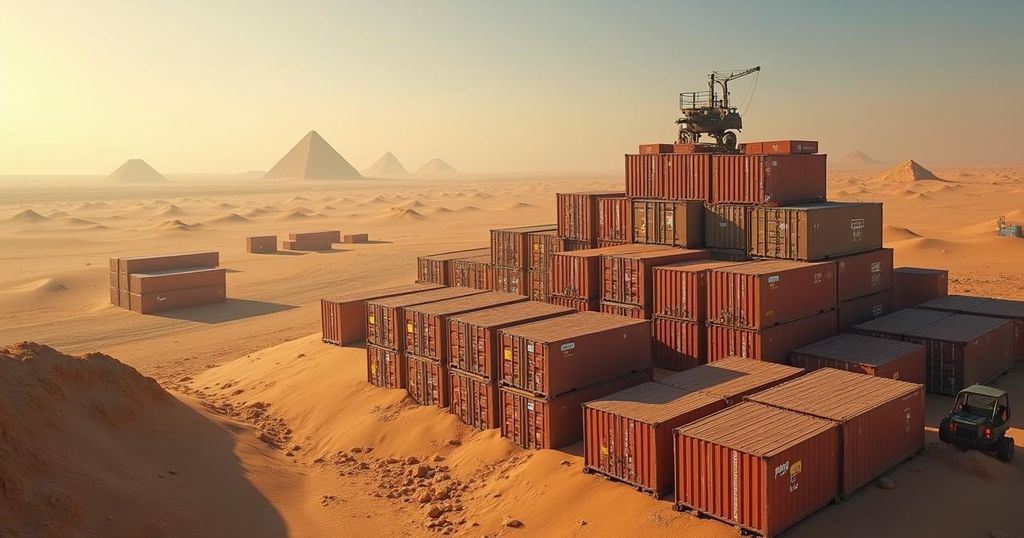RSF Implements Export Ban on Sudanese Goods to Egypt, Heightening Tensions

The Rapid Support Forces in Sudan have banned all exports to Egypt, citing Cairo’s interference in Sudan’s affairs, particularly amid accusations of air strikes against the RSF. The ban, which will affect regions controlled by the RSF, raises significant concerns about Sudan-Egypt relations and could lead to further regional conflict. Observers warn of dire implications for trade and potential military escalation.
The Rapid Support Forces (RSF) of Sudan, led by General Mohammed Hamdan Dagalo, commonly referred to as Hemedti, proclaimed a ban on all exports from Sudan to Egypt on Saturday. This decision came as a reaction to what Hemedti described as Egyptian interference in Sudan’s domestic affairs. Earlier in the week, he accused the Egyptian government of conducting air strikes against RSF forces, a claim that has been categorically denied by the Egyptian Foreign Ministry. The export ban is set to take effect in regions of Sudan under RSF control, signaling a notable shift in the relationship between the two neighboring nations. Abu Shoutal, a prominent RSF member in the Blue Nile region, issued a stern warning to local merchants, stating that sending any exported goods to Egypt would result in accountability measures. He stated, “If the merchants send even one unit of their products, they will be punished. Our exports should be sent to all of our neighbors, except for Egypt.” Furthermore, he emphasized the seriousness of the ban by declaring that any truck destined for Egypt via the al-Dabba crossing should be treated as hostile. Sudanese exports to Egypt primarily consist of agricultural and livestock products such as peanuts, corn, sesame seeds, gum Arabic, camels, and cattle, chiefly sourced from RSF-dominated regions like Darfur and Kordofan. The RSF has control over regions bordering Egypt, critical for these exports. This ban complicates the export landscape significantly, raising concerns amongst observers. Rasha Awad, a journalist and civil rights activist, articulated that this development represents a critical juncture in Sudan-Egypt relations, potentially escalating tensions into an outright confrontation between the RSF and Egyptian authorities. Moreover, she expressed concerns that this embargo could escalate the ongoing conflict in Sudan, possibly drawing in regional players such as Ethiopia. Awad also raised pertinent questions regarding the RSF’s ability to provide markets for goods that were previously exported to Egypt, asking, “Who will buy the banned products and is there a safe alternative to the Egyptian markets?” She suggested the unfolding situation might serve as a pretext for heightened military conflict within Sudan, indicating that the next few days will reveal further implications. Additionally, analyst Mohammed Latif noted that the dynamics of Sudanese-Egyptian relations will fundamentally change after the initiation of this ban. Supporters of the RSF circulated videos showing trucks that were reportedly denied access to the border with Egypt following Hemedti’s directives forbidding public displays of his forces’ operations.
The decision by the Rapid Support Forces to implement an export ban on Sudanese goods to Egypt highlights a significant strain in bilateral relations, rooted in accusations of interference and military aggression. This move reflects growing tensions between the two nations, with the RSF—a powerful paramilitary group in Sudan—positioning itself firmly against perceived external threats. The economic repercussions of this ban are profound, impacting the agricultural and livestock sectors that rely heavily on exports to Egypt. Observers are particularly concerned about the implications for regional stability and trade dynamics.
In summary, the RSF’s export ban on goods to Egypt marks a critical escalation in Sudanese-Egyptian relations, underscored by allegations of military aggression and interference. The ban poses serious questions about regional stability and the economic ramifications for both nations, particularly given the RSF’s control over key export regions. As stakeholders assess the potential for conflict escalation, it remains to be seen how these developments will unfold in the coming days.
Original Source: english.aawsat.com








